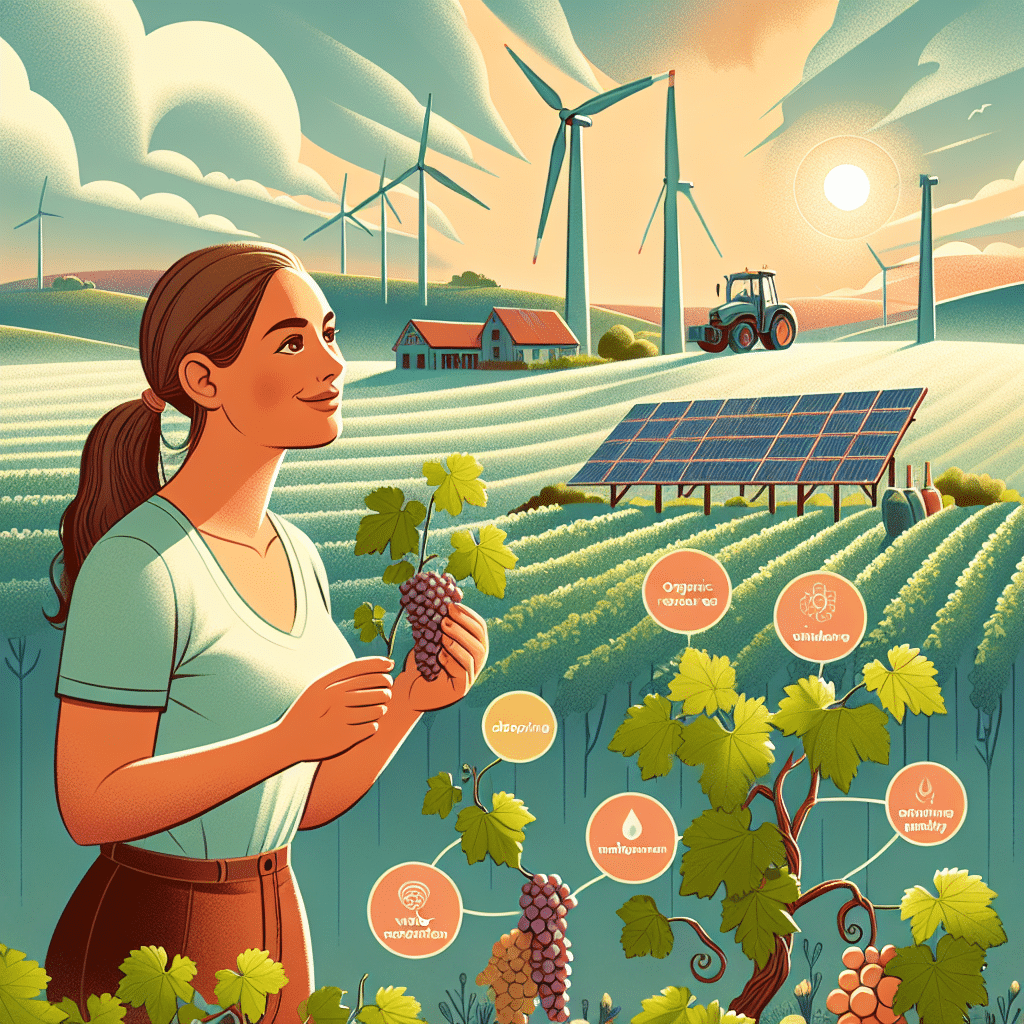How Winemakers Adapt in a Changing Climate
-
Table of Contents
- Winemakers’ Strategies for Adapting to Climate Change
- Understanding the Impact of Climate Change on Viticulture
- Adaptive Viticulture: Winemakers’ Response to Climate Change
- 1. Exploring New Terroirs
- 2. Experimenting with Grape Varieties
- 3. Vineyard Management Innovations
- 4. Technological Advancements
- 5. Sustainable Practices
- Case Studies: Wineries Leading the Charge
- Challenges and Opportunities
- Conclusion: The Resilient Future of Winemaking
- Enhance Your Health with ETprotein’s Premium Protein Products
Winemakers’ Strategies for Adapting to Climate Change

Climate change poses significant challenges to the global wine industry, affecting the delicate balance of conditions required for premium wine production. As temperatures rise, precipitation patterns shift, and extreme weather events become more common, winemakers are compelled to adapt their practices to maintain the quality and sustainability of their vineyards. This article explores the innovative strategies that winemakers are employing to combat the effects of a changing climate.
Understanding the Impact of Climate Change on Viticulture
Before delving into adaptation strategies, it’s crucial to understand how climate change is altering viticulture. Wine grapes are particularly sensitive to climatic conditions; even small changes in temperature, sunlight, and water availability can affect the grapes’ sugar, acid, and phenolic content, ultimately influencing the wine’s flavor, aroma, and color. Statistics show that global wine regions are experiencing earlier harvests, with some regions harvesting up to two weeks earlier than they did 50 years ago.
Adaptive Viticulture: Winemakers’ Response to Climate Change
Winemakers are not standing idly by as the climate shifts. They are actively seeking and implementing a variety of adaptive measures to ensure the resilience of their vineyards and the quality of their wines.
1. Exploring New Terroirs
- Seeking Higher Altitudes: Winemakers are planting vineyards at higher elevations to take advantage of cooler temperatures.
- Latitude Adjustments: Some are exploring regions further from the equator, where the climate is more suitable for traditional grape varieties.
2. Experimenting with Grape Varieties
- Drought-Resistant Varietals: The introduction of grape varieties that can withstand water stress is becoming more common.
- Heat-Tolerant Grapes: Winemakers are also experimenting with grapes that can maintain acidity and flavor profiles in warmer conditions.
3. Vineyard Management Innovations
- Canopy Management: Techniques such as leaf thinning and trellising are being adjusted to protect grapes from sunburn and promote airflow.
- Water Conservation: Precision irrigation and dry farming methods are being employed to optimize water use.
4. Technological Advancements
- Climate Modeling: Winemakers are using sophisticated models to predict future climate scenarios and inform their decisions.
- Data-Driven Agriculture: Sensors and drones are being used to monitor vineyard conditions and manage resources more efficiently.
5. Sustainable Practices
- Organic Farming: A shift towards organic viticulture helps promote soil health and biodiversity, increasing the vineyard’s resilience.
- Carbon Footprint Reduction: Efforts to reduce greenhouse gas emissions include using renewable energy sources and sustainable packaging.
Case Studies: Wineries Leading the Charge
Several wineries around the world serve as exemplary case studies for successful adaptation to climate change:
- In California, some wineries have installed weather stations and utilize shade cloths to protect their vines from heatwaves.
- French winemakers are researching grape varieties that mature later, delaying the harvest time to cope with warmer autumns.
- New Zealand vineyards are leading in precision agriculture, using data analytics to optimize water and nutrient use.
Challenges and Opportunities
While adaptation is necessary, it is not without its challenges. Winemakers face the costs of implementing new technologies and practices, the uncertainty of how wine markets will respond to new grape varieties, and the need for ongoing research and development. However, these challenges also present opportunities for innovation, collaboration, and the development of new wine styles and regions.
Conclusion: The Resilient Future of Winemaking
In conclusion, the wine industry’s response to climate change is multifaceted, involving a combination of traditional knowledge and cutting-edge technology. By exploring new terroirs, experimenting with grape varieties, innovating vineyard management, leveraging technology, and embracing sustainability, winemakers are not only adapting to a changing climate but are also paving the way for a resilient and dynamic future for wine production.
Enhance Your Health with ETprotein’s Premium Protein Products
As winemakers adapt to the changing climate, consumers can also make healthier choices by incorporating high-quality protein into their diets. ETprotein offers a range of organic bulk vegan proteins that are non-GMO, allergen-free, and feature a neutral taste. Their L-(+)-Ergothioneine (EGT) products, available in various grades, boast over 98% purity, catering to the nutraceutical, pharmaceutical, cosmeceutical, and food and beverage industries. Enhance your health and well-being with ETprotein’s superior protein products.
About ETprotein:
ETprotein, a reputable protein and L-(+)-Ergothioneine (EGT) Chinese factory manufacturer and supplier, is renowned for producing, stocking, exporting, and delivering the highest quality organic bulk vegan proteins and L-(+)-Ergothioneine. They include Organic rice protein, clear rice protein, pea protein, clear pea protein, watermelon seed protein, pumpkin seed protein, sunflower seed protein, mung bean protein, peanut protein, and L-(+)-Ergothioneine EGT Pharmaceutical grade, L-(+)-Ergothioneine EGT food grade, L-(+)-Ergothioneine EGT cosmetic grade, L-(+)-Ergothioneine EGT reference grade and L-(+)-Ergothioneine EGT standard. Their offerings, characterized by a neutral taste, non-GMO, allergen-free attributes, with L-(+)-Ergothioneine purity over 98%, 99%, cater to a diverse range of industries. They serve nutraceutical, pharmaceutical, cosmeceutical, veterinary, as well as food and beverage finished product distributors, traders, and manufacturers across Europe, USA, Canada, Australia, Thailand, Japan, Korea, Brazil, and Chile, among others.
ETprotein specialization includes exporting and delivering tailor-made protein powder and finished nutritional supplements. Their extensive product range covers sectors like Food and Beverage, Sports Nutrition, Weight Management, Dietary Supplements, Health and Wellness Products, and Infant Formula, ensuring comprehensive solutions to meet all your protein needs.
As a trusted company by leading global food and beverage brands and Fortune 500 companies, ETprotein reinforces China’s reputation in the global arena. For more information or to sample their products, please contact them and email sales(at)ETprotein.com today.












